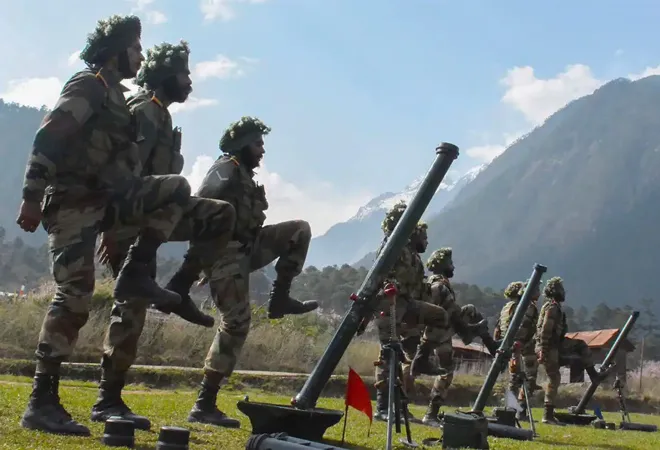Recent clashes between Indian and Chinese soldiers along the Line of Actual Control, or LAC, have once again underscored how a 20th century conflict continues to shape the 21st century trajectory of Sino-Indian relations and constrain New Delhi’s aspirations to play a larger role on the global stage. The Galwan Valley crisis of 2020 made it clear that Beijing had no intention of diplomatically resolving its border dispute with India. It also pushed Indian decision-makers into making certain choices that they were reluctant to make in the past, hoping against hope that engagement with China would be enough to produce the desired results. That Xi Jinping’s China had different ideas about its role in the world and India’s place in it should have been clear long ago, as the Chinese Communist Party went for aggressive postures in various parts of the world.
Managing a rising power at one’s doorstep is a difficult task for any nation and much more for a country that has border disputes with that power. It was incumbent upon New Delhi to engage with Beijing on trade, culture and even on border issues. But not preparing the nation internally to eventually meet the China challenge has been the singular failure of Indian policymakers on this front, especially over all those decades when Beijing was more focused on internal consolidation. There was a huge constituency in India that believed that after gaining territory in 1962 at India’s expense, China had become a satisfied power. The argument went that China was now invested in the status quo, and so had no reason to disturb that.
As a result, border negotiations were compartmentalized as the bilateral focus shifted to trade and people-to-people ties, which were deemed as ends in and of themselves. The pretence of dialogue continued even as China’s ‘salami slicing’ went on unhindered. Even just a few years back, India’s crème de la crème believed that in the name of ‘non-alignment 2.0’, it was possible to maintain equidistance between China and the United States.
The liberal optimism about the Chinese Communist Party suddenly embracing democracy has finally been thrown to oblivion.
China’s rise has had an impact on the entire world and most nations have been found wanting in their response. The liberal optimism about the Chinese Communist Party suddenly embracing democracy has finally been thrown to oblivion. But New Delhi, which has been one of the first countries to face the reality of China as a neighbour, should have been better prepared. The Galwan crisis finally made us realize that time is really running out and some key decisions would have to be made. We are busy today building border infrastructure, modernizing our defence forces, mobilizing our forces and upgrading partnerships with like-minded countries.
Yet, as a nation, we still do not seem united in the message we want to send Beijing. There is enough blame to go around and history won’t be kind to anyone—politicians, bureaucrats or even the military.
But, as we look forward at a time we are more confident of ourselves, we need to be able to speak as a united front. Challenges are only going to mount in the future as India prepares to strengthen its inner resources to take on the China challenge, and China, facing multiple setbacks on the domestic and foreign policy fronts, tries to find chinks in India’s armour. At a time when the world is looking at India with a renewed sense of optimism and with New Delhi’s G20 presidency, China might be tempted to bring India down a notch.
New Delhi has been making a point since the 2020 border crisis that these are “abnormal” times in Sino-Indian relations, and unless Beijing demonstrates a greater degree of sensitivity towards Indian concerns based on mutual respect, there is unlikely to be a change. But Beijing clearly remains reluctant to change track. In fact, the narrative in China seems to be about blaming India for the border trouble while conceding no part of China in the process.
Challenges are only going to mount in the future as India prepares to strengthen its inner resources to take on the China challenge, and China, facing multiple setbacks on the domestic and foreign policy fronts, tries to find chinks in India’s armour.
The Chinese Communist Party is propagating a narrative that the recent downturn in Sino-Indian ties is a function of the United States trying to pull New Delhi into its orbit, thereby denying any agency to India in shaping its policy vis-à-vis China. More worryingly, however, it is also being suggested in China that it is the Narendra Modi government’s nationalist agenda that is responsible for “creating” the current border crisis; it is all, therefore, India’s fault that Sino-Indian ties are facing strong negative headwinds and the onus is on New Delhi to improve them.
This narrative makes it highly unlikely that India and China will be able to find a modus vivendi anytime soon to move ahead and chart a more productive course in their bilateral engagement.
That India has been better able to manage its recent crises—be it the health crisis induced by covid or the energy crisis as a result of the Russia-Ukraine war—than many had anticipated seems to have aggravated this sense in Beijing that India needs to be ‘shown its place’.
The contrast at this juncture between an India that is getting many things right and a China that appears to be getting a lot of things wrong is quite vivid. This makes it even more imperative for India to keep a close watch on Chinese behaviour and its own preparedness in tackling the challenges emanating from it.
This commentary originally appeared in Live mint.
The views expressed above belong to the author(s). ORF research and analyses now available on Telegram! Click here to access our curated content — blogs, longforms and interviews.




 PREV
PREV


